Energy-efficient products help users save money through decreased energy consumption and help conserve resources. Energy efficiency is a way to save the planet.Scientists warn that people are turning the globe into a hothouse by burning oil and other fuels that emit carbon dioxide, a gas that insulates the atmosphere.
According to this information, why, in addition to trying to save money, do many people buy energy-efficient products?
You will be able to use an Information button to view the material on each question screen.
This 1868 lithograph shows an idealized scene presenting farmers and settlers from the East, along with railroads, moving into lands already occupied by Native Americans.
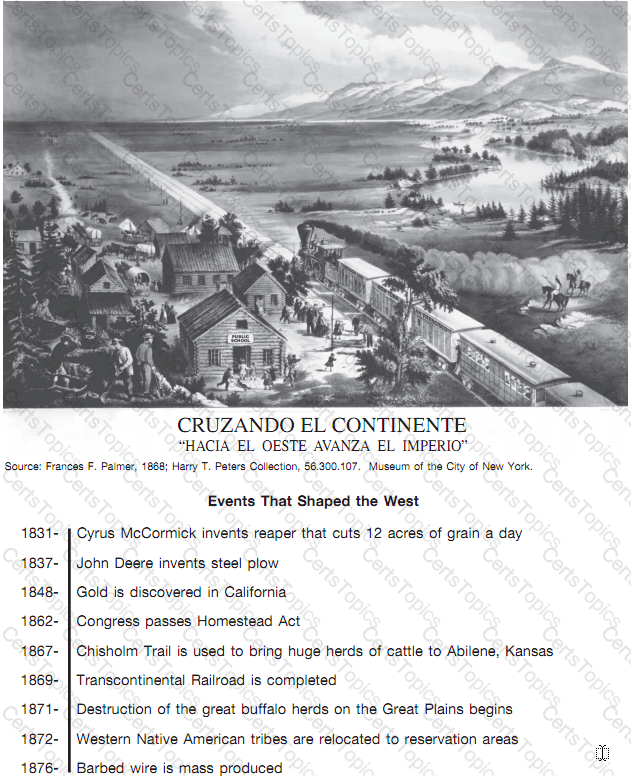
-- Exhibit --
This 1868 lithograph shows an idealized scene presenting farmers and settlers from the East, along with railroads, moving into lands already occupied by Native Americans.
-- Exhibit --
Why did many people in the United States move to California in 1849?
On March 5, 1946, British Prime Minister Winston Churchill spoke in Fulton, Missouri. Excerpts from that address follow:
"From Stettin in the Baltic to Trieste in the Adriatic, an iron curtain has descended across the Continent. Behind that line lie all the capitals of the ancient states of Central and Eastern Europe. All these famous cities and the populations around them lie in what I must call the Soviet sphere, and all are subject in one form or another, not only to Soviet influence, but to a very high and, in many cases, increasing measure of control from Moscow."
"If the Western democracies stand together in strict adherence to the principles of the United Nations Charter their influence for furthering those principles will be immense, and none is likely to molest them..."
Excerpts from an address by Sir Winston Churchill, March 5, 1946, Vital Speeches, Volume 12.
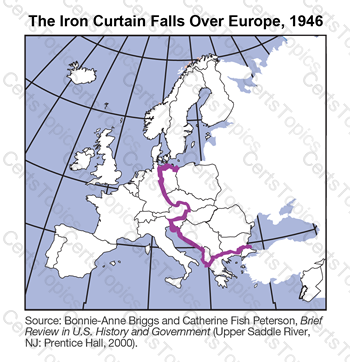
Why did Churchill make this speech?
In 1947, the United Nations (UN) tried to resolve the conflict over land between Arabs and Jews living in the former British mandate of Palestine.The UN recommended that Palestine be partitioned into two states—Arab and Jewish—and that the city of Jerusalem become a UN trusteeship.The majority of people living in Palestine were Arabs, and Arab leaders in Palestine rejected the plan.Jewish leaders accepted the plan and proclaimed the state of Israel within their part of Palestine. Almost immediately, war broke out between seven Arab nations and Israel.
Based on the information above, which was the main reason for the 1948 war in the Middle East?
How does the Toyota system differ from the classic Ford manufacturing process?
-- Exhibit–
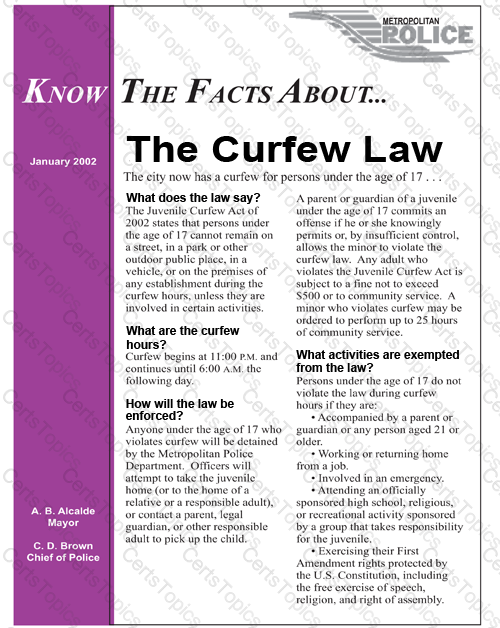
-- Exhibit --
Which is one likely reason the metropolitan government enacted the Juvenile Curfew Act?
-- Exhibit --
This letter was written by a member of the American Anti-Slavery Society.
To Mr. T. D. Weld
Dear Sir:
"You have been appointed an agent of the American Anti-Slavery Society. . . . Our object is the overthrow of American slavery. We expect to accomplish this, mainly by showing to the public its true character . . . its denial of the first principles of religion, morals, and humanity. . . .
"You will teach everywhere, the great fundamental principle of IMMEDIATE ABOLITION, as the duty of all masters. . . . Insist principally on the SIN OF SLAVERY, because our main hope is in the consciences of men.
"The people of color ought at once to be emancipated and recognized as citizens, and their rights secured, equal in all respects to others, according to the fundamental principle laid down in the American Declaration of Independence."
Letters of Theodore Dwight Weld, Angelina Grimke Weld, and Sarah Grimke, Volume I (New York: Appleton-Century-Crofts, 1934), 124–28.
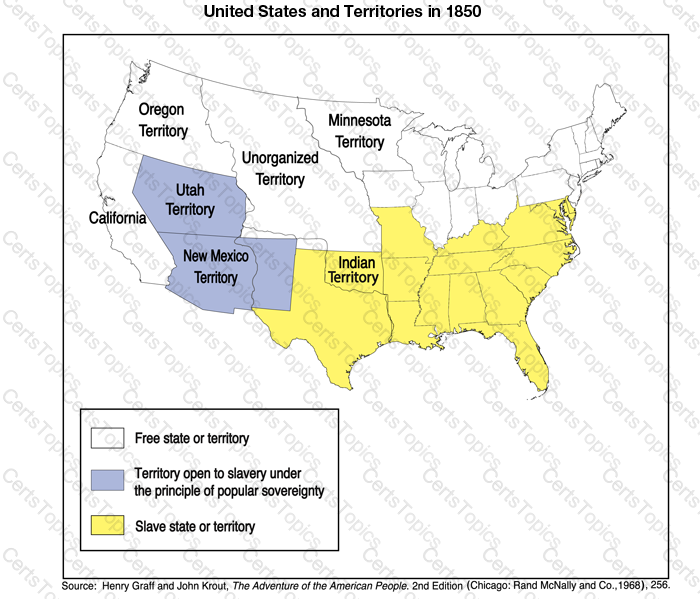
-- Exhibit --
Based on the map, residents of which area of the country would have most strongly protested the ideas expressed in the letter?
Which factor helped the Romanies survive in Europe after World War II?
In August 1964, President Lyndon B. Johnson asked Congress to ratify the Gulf of Tonkin Resolution so that he could officially use military force in Vietnam, he told Congress:
"The challenge we face in Southeast Asia today is the same challenge that we have faced with courage and that we have met with strength in Greece and Turkey, in Berlin and Korea."
What did President Johnson ask Congress to do in 1964?
Exhibit:
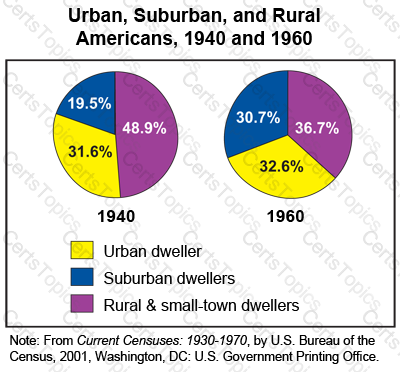
Based on the charts, which belief best reflects the changes in American living patterns between 1940 and 1960?
Which activity is an example of competition within a group?
Based on the tone and content of his speech, what most likely was the political role that Pericles held in Athens?
Which of the following developments would Speaker A most likely support?
Based on the viewpoint, which statement about family life is supported?
A presidential candidate was born and raised in New England. Because support was also needed from other areas in the United States, the vice presidential candidate was chosen from a large Midwestern state.
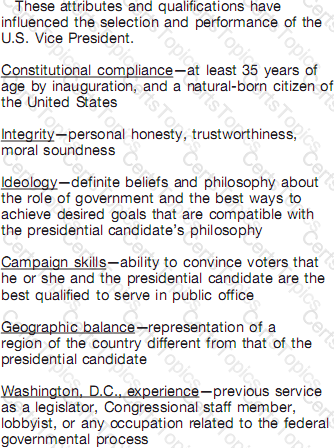
In the example above, which vice presidential qualification did the presidential candidate hope would help win the election?
Exhibit:
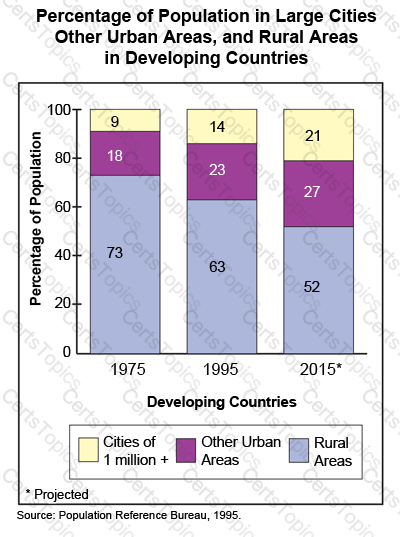
Based on the graph at the left, how does rural and urban population growth in developing countries compare between 1975 and 2015?
-- Exhibit --
The responsibilities of a citizen who lives in a democracy are similar in some ways to those of a citizen in a totalitarian state. For example, a citizen under either system is expected to pay taxes and vote.
However, there are important differences between the two systems. In a democracy, a citizen is expected to respect the rights and opinions of others. The state encourages citizens to become involved in community groups and allows political protest. In a democracy, a citizen has more rights and freedom to carry out his duties. The state exists for the good of the citizen.
In a totalitarian society, the state controls every aspect of human life, and the citizen exists for the good of the state. The primary responsibility of the citizen is to obey and follow. The citizen can vote for only government-approved candidates. The ruling party members or people who support them fill all offices and law-making bodies. Some criticism of the state may be allowed. However, any citizen activity that could interfere with the state, such as a protest march, is outlawed in a totalitarian state
Adapted from Raymond Yuen, publisher, The Way to U.S. Citizenship (Carlsbad, Calif.: Dominie Press, Inc., 1997),116; World Book Encyclopedia, Volume 19 (Chicago: World Book, Inc., 2001), 344.
-- Exhibit --
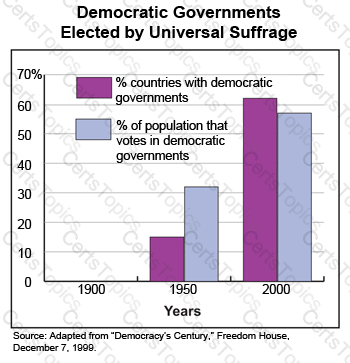
Which conclusion about citizenship in the world between 1950 and 2000 is best supported by information in the graph?
Which statement about personal finances best represents the views expressed in the passage?
Which is the best example of climate placing limits on human life?
The following text is the Oath of Allegiance taken by a person becoming a naturalized citizen of the United States.
“I hereby declare, on oath, that I absolutely and entirely renounce and abjure all allegiance and fidelity to any foreign prince, potentate, state, or sovereignty of whom or which I have heretofore been a subject or citizen; that I will support and defend the Constitution and laws of the United States of America against all enemies, foreign and domestic; that I will bear true faith and allegiance to the same; that I will bear arms on behalf of the United States when required by thelaw; that I will perform noncombatant service in the Armed Forces of the United States when required by law; that I will perform work of national importance under civilian direction when required by law; and that I take this obligation freely without any mental reservation or purpose of evasion; so help me God.”
Which is an example of a violation of the Oath of Allegiance to the United States?
-- Exhibit–
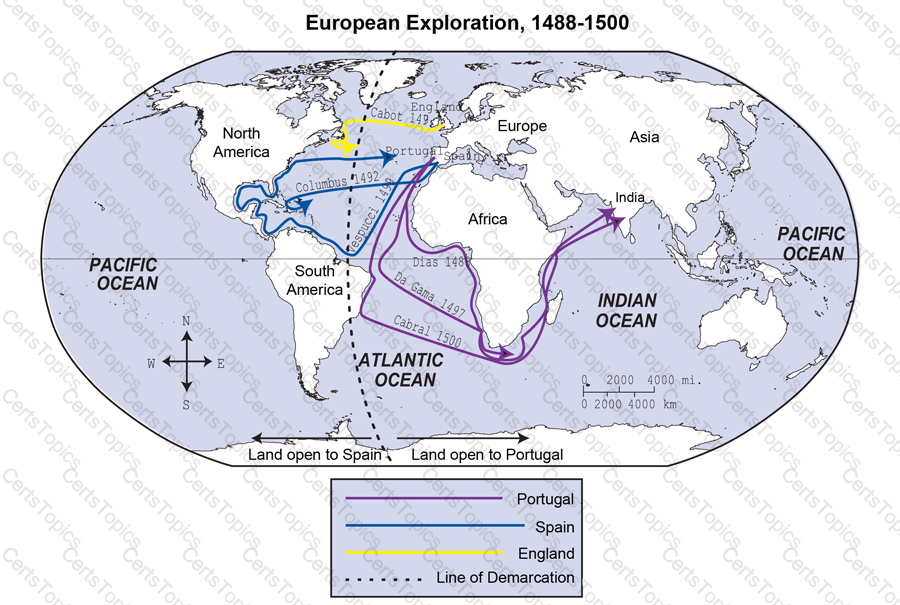
-- Exhibit --
In 1493, Pope Alexander VI settled land disputes between Spain and Portugal by creating the Line of Demarcation on the map of the world.
How did this land settlement affect Spain?
-- Exhibit–
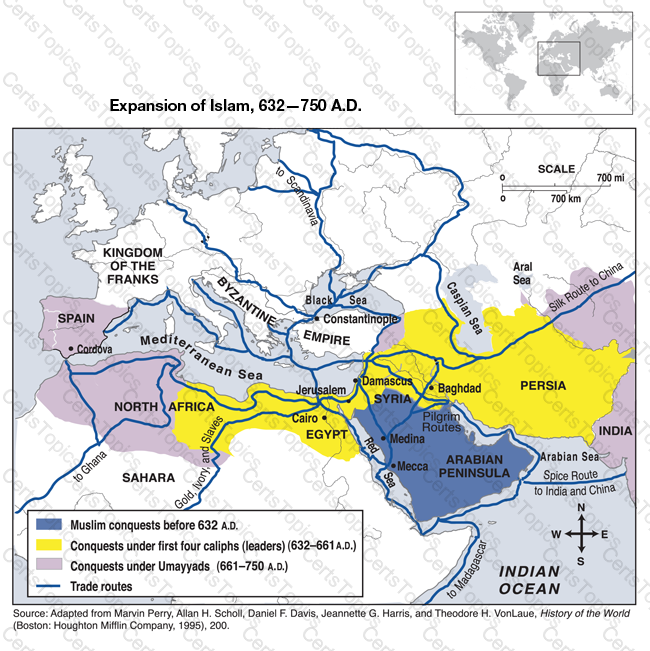
-- Exhibit --
What does information in the map imply about the relationship between religion and government in the illustrated region of the world?
-- Exhibit–
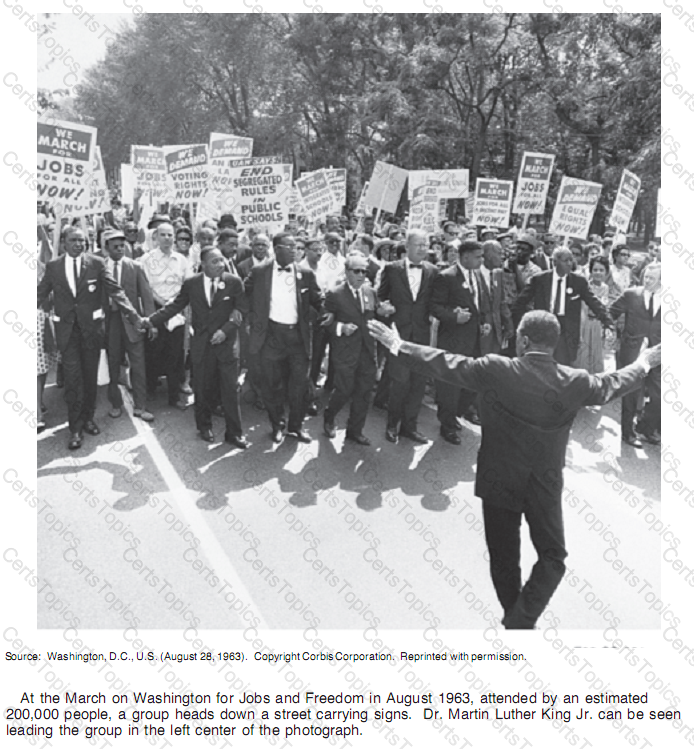
-- Exhibit --
What other activities of this type occurred later in the same decade in America?
The U.S. Supreme Court’s desegregation ruling in 1962 supports which idea in U.S. history?
In 1885, Granville T. Woods patented a device that combined the telegraph (first used in the 1840s) with the telephone (patented in the 1870s) and called it a "telegraphony." Instead of reading or writing the Morse code signals, an operator could speak near the telegraph key. This device made it possible to receive oral and signaled messages clearly over the same line.In addition to the telegraph, telephone, and telegraphony, the typewriter was invented around this time.
Which of the following statements best describes the long-term effects of these inventions on life in the United States in the early twentieth century?
You will be able to use an Information button to view the material on each question screen.
This 1868 lithograph shows an idealized scene presenting farmers and settlers from the East, along with railroads, moving into lands already occupied by Native Americans.
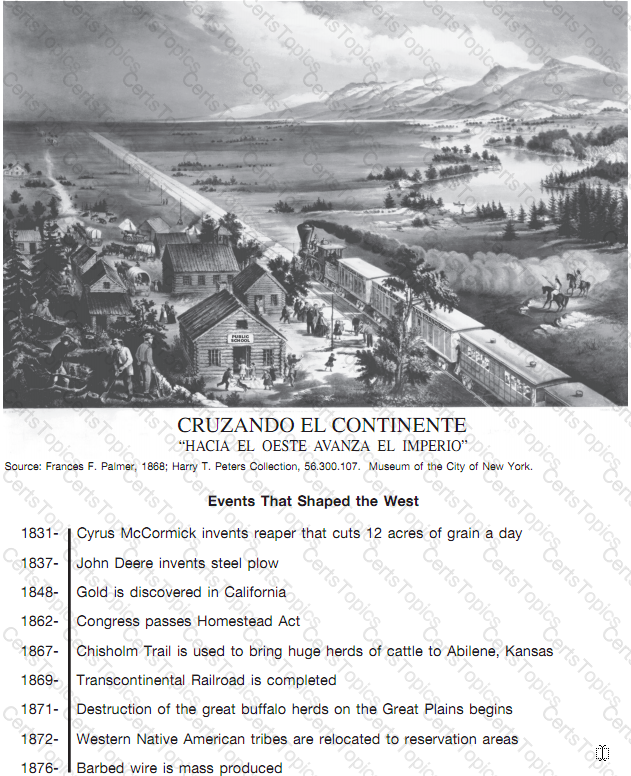
-- Exhibit --
This 1868 lithograph shows an idealized scene presenting farmers and settlers from the East, along with railroads, moving into lands already occupied by Native Americans.
-- Exhibit --
Which technology contributed to greater wheat harvests in the West?
Exhibit:
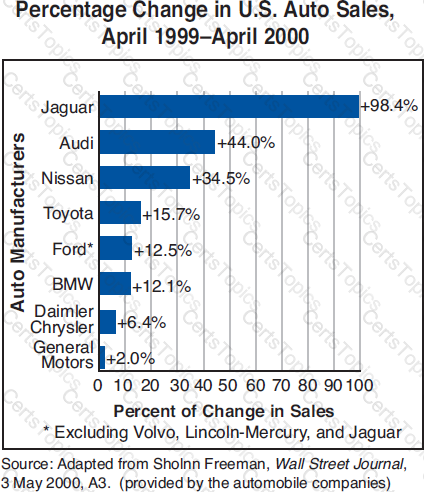
If the trends in the graph at the left continued, a businessperson planning to open a successful car dealership in April 2000 should have taken which action?
In 1963, President Johnson secured approval from Congress to begin his War on Poverty, which allocated $1 billion to the Office of Economic Opportunity to increase employment programs. President Johnson supported the Civil Rights Act, which outlawed discrimination on the basis of color, race, religion, gender, or national origin in public accommodations and employment. After election to a term as president, he introduced Medicare, which provided a two-part plan that insured all Americans over 65 against expensive hospital bills and provided inexpensive insurance for those covered by Social Security.
Exhibit:
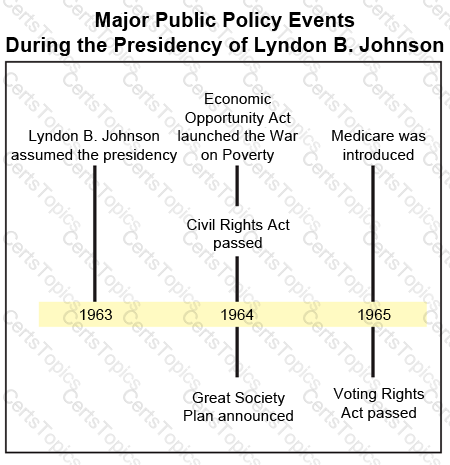
Based on the information, which statement is an OPINION rather than a fact about the Johnson administration?
-- Exhibit --
-- Exhibit --
Andrew Carnegie stated that:
“Surplus wealth is a sacred trust which its possessor is bound to administer in his lifetime for the good of the community. . .”
Based on this statement, which belief did Andrew Carnegie most likely hold?
Which law in the new Czech Republic would Michal Huzak and those who share his beliefs most likely have supported?
According to this information, how much time do most Americans spend focusing on their personal finances?
-- Exhibit --
Saharan dust clouds brought particles of dust with iron to the waters off Florida’s west coast, creating huge blooms [deposits] of toxic red algae.The Saharan dust entered the upper atmosphere and circled the globe.
When the dust reached the Florida’s west coast, it increased surface water iron concentrations there by 300%, which then increased by tenfold the count of bacteria in the water.These bacteria caused a “red tide” which can kill some forms of marine life and causes serious skin and respiratory problems in humans.By using satellites to monitor Saharan dust clouds and bacteria blooms, scientists will one day be able to forecast red tides in areas that will be affected.
-- Exhibit --
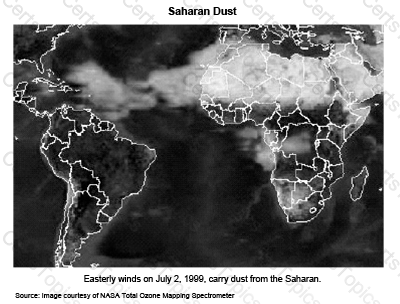
Which long-term ecological problem was caused by the arrival in Florida of Saharan dust?
"When the power of making laws and the power of executing them are united in the same person. . . there can be no liberty."
Montesquieu
Spirit of the Laws, 1750
Based on the quotation by Montesquieu, which feature of the U.S. government illustrates a solution to the stated situation?
Exhibit:
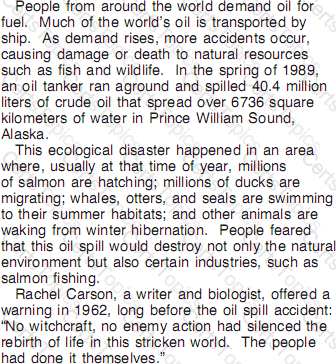
According to this information, which of the following is an example of an ecological disaster?
-- Exhibit–
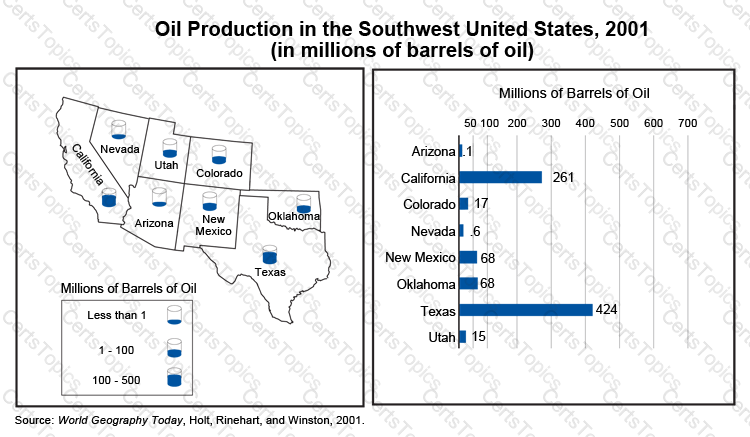
-- Exhibit --
Which is the best reason for using the bar graph rather than the map?
-- Exhibit–

-- Exhibit --
Which statement of opinion supports continued funding for projects such as those on the time line in the 1980s and 1990s?
“Victory Gardens” were small home and community vegetable gardens planted and maintained by patriotic citizens in the United States during World War II.
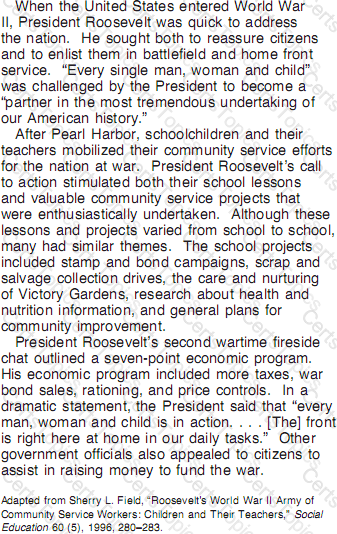
Together with home and community projects described in the passage, what did these gardens primarily encourage in the United States during World War II?
-- Exhibit --
This letter was written by a member of the American Anti-Slavery Society.
To Mr. T. D. Weld
Dear Sir:
"You have been appointed an agent of the American Anti-Slavery Society. . . . Our object is the overthrow of American slavery. We expect to accomplish this, mainly by showing to the public its true character . . . its denial of the first principles of religion, morals, and humanity. . . .
"You will teach everywhere, the great fundamental principle of IMMEDIATE ABOLITION, as the duty of all masters. . . . Insist principally on the SIN OF SLAVERY, because our main hope is in the consciences of men.
"The people of color ought at once to be emancipated and recognized as citizens, and their rights secured, equal in all respects to others, according to the fundamental principle laid down in the American Declaration of Independence."
Letters of Theodore Dwight Weld, Angelina Grimke Weld, and Sarah Grimke, Volume I (New York: Appleton-Century-Crofts, 1934), 124–28.
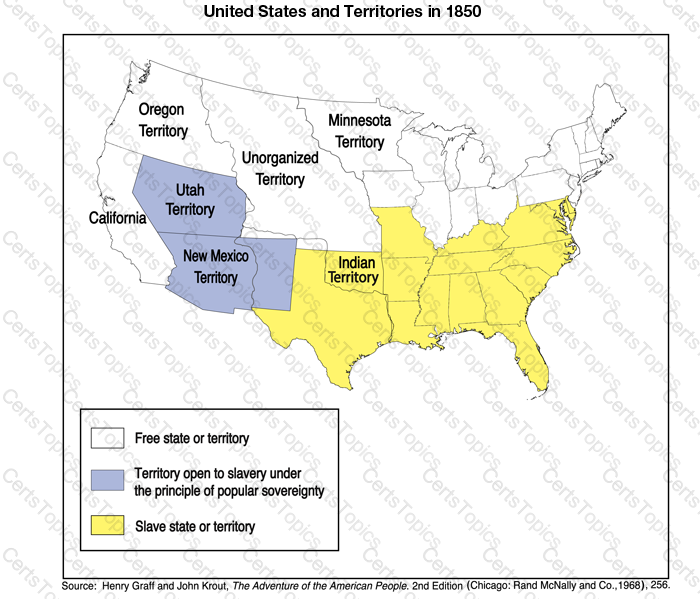
-- Exhibit --
The writer of the letter assumed which of the following statements was true?
-- Exhibit–
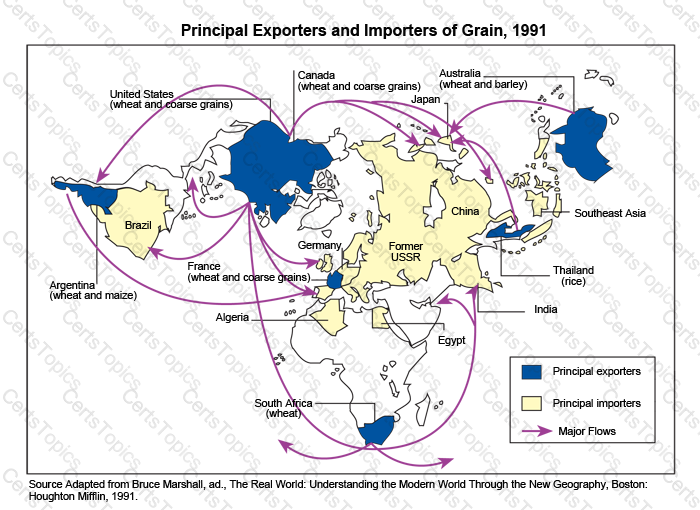
-- Exhibit --
What does the map show about developed countries’ grain imports and exports in 1991?
Exhibit:
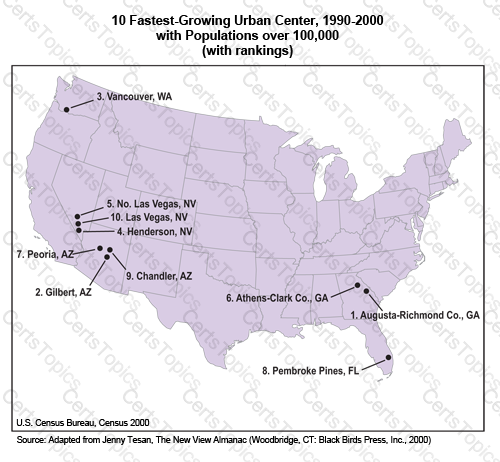
Which observation about migration in the United States from 1990 to 2000 is supported by the map?
In the early 1940s, a team of Harvard graduate students and IBM engineers built Mark I, the first electromechanical computer; its use expanded from government to business, and, in the 1990s, to the home. Computers have made it possible to gather, store, and distribute information faster than ever before in history.
Which occurrence is a possible harmful side effect of this trend in information management?
Which of the following speakers or pair of speakers supported the New Deal legislation?
-- Exhibit–
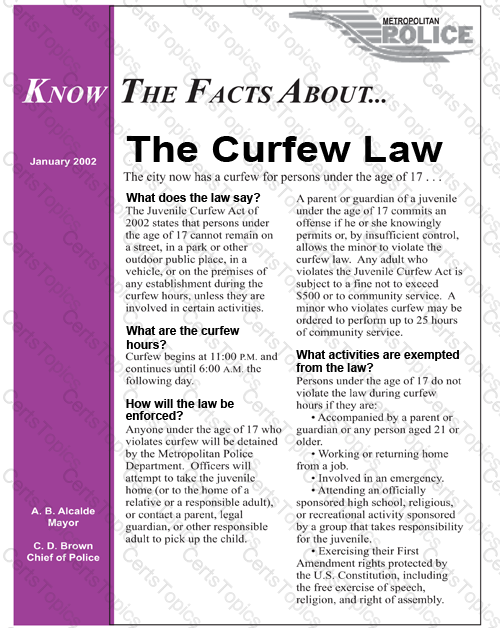
-- Exhibit --
According to the Juvenile Curfew Act, which of the following should anyone under the age of 17 with a nighttime job be sure to do?
A primary source is an eyewitness account of an event, original document, or article created or written by people who took part in the event.
According to this definition, which is a primary source for learning about life in Africa?
Exhibit:
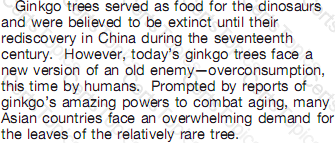
If leaders of Asian countries wanted to increase and sustain trade revenue from the sale of ginkgo, which action would most likely help them accomplish this goal?